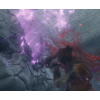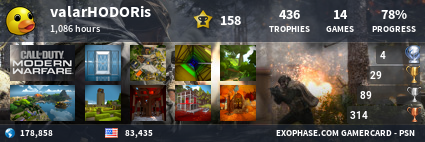A Reflection on Assassin's Creed's "Spirit"
I was having a chat with a friend of mine two days ago, and we were talking about how, in Assassin's Creed 1, the player is capable of Air Assassinating guards, but it's much more difficult to execute than in the later games.
In games after AC1, the player can just be above a Guard and tap their Assassinate button to launch the animation, where it will just about guarantee the kill, with no extra effort.
In AC1, the player has to be running at the target, they have to time the Assassinate button press, and they are unable to Air Assassinate at distances or heights that they can while Synced as the later Assassins.
One of the cool things that came to mind was, the technique only existed in Altair's mind. He was still developing it over the course of AC1, which is why the player can do it, but it's not easy, it's sloppy. Altair's not used to it. He's still figuring it out. I can't do it from this range. I can kill guards from this height. This is the speed at which I fall. This is the chance they catch my blade and defend themselves. He has to do so much more thinking, so much more work because if this knowledge existed anywhere else, he and the entire Levantine Brotherhood certainly never encountered it. He kept the knowledge to himself, working on making it better and better on his own time.
Likewise, Shock and Awe combat in AC1, where Demoralized/Ill/Taunting guards can be Assassinated, and the Fear effect propagated across an entire group, is an early showing of the Killchain system from Brotherhood, Revelations, and the games after them, which mostly all use Killchains to a certain extent, whether easier or harder. (Unity does not, but even that game can emulate it with a high enough level weapon.) Killchains / Killflow becomes kind of the combat trademark of the Assassins across the centuries, they're dancing death-dealers. Even in name, Assassins Kill. Assassins do not merely Damage. So as players, we do not merely Damage, each button press is a Kill, we are Fatal, Lethal. We are Assassins. The only thing that was missing was a sense of dancing on the razor's edge, the sensation that we ourselves could Desync from an enemy landing a lucky stab on us.
Yes, this is obviously Ubisoft prototyping and checking out the possibility of such a system in a very early incarnation, but the Lore reasons are always interesting to think about, especially since they're so plausible, given that Altair is well-known for being the guy that invents new tech and skills that future Assassins eliminate their enemies with.
In AC1 it could only be done with the Hidden Blade, because it was a weapon that the enemy would not expect, a weapon the Templars perhaps didn't understand very well yet. Certainly not the rank and file infantry and soldiers of the cities Altair was active in. It was difficult to do, as Altair could not Block with the Hidden Blade, and indeed, especially not if he wasn't Focused (represented as Lock-On) on an enemy but was running among their group freely, to chase the next sickly guard he could kill.
Later he likely realized there should be ways for an Assassin to more properly stand their ground and fight with these techniques, so an armored plate for the Hidden Blade's bracer became a good idea. With the Apple, he developed this. Likewise, he used it to finalize and perfect his Air Assassination technique, and others like Ledge Assassinations and Hiding Spot Assassinations became perfected as well, so the knowledge and tools could be spread and shared freely between all Assassins, that the entire Brotherhood might grow stronger.
There was something so beautiful, so mystical about the classic AC games having so much of their mechanics justifiable in-universe, justifiable via Lore and critical thinking. Likewise, so many elements of their narrative could be subtly seen through gameplay, like Desmond no longer needing to be fully Synced with Altair in order to use Eagle Vision after finishing his AC1 memories, because Desmond's human mind in the real world can innately use the ability and no longer needs to piggy-back off of Altair's consciousness.
Or that the final fight in AC1 didn't actually drain Altair's vitality, just that the illusions that were cast by the Apple were so incomprehensible to a human mind that the Animus just couldn't render them properly and the intensity of the experience dropped Desmond's Sync with Altair to zero. His mind was not used to such things, so maintaining the connection, maintaining his acceptance of Altair's reality in the face of his brain screaming no, no, no, this can't be REAL was difficult. The same thing happens to Callum Lynch in the Assassin's Creed film; he fails the first Leap of Faith he experiences, because he just cannot bring himself to believe that a man could survive such a fall. He couldn't take it, his mind just could not accept that reality and Desynchronized.
I think these things, all of the above, or more accurately, the lack of them in recent games, tie into just what fans of these games mean when they talk about how Assassin's Creed has "lost its SOUL or something," and aren't sure how to explain what they're trying to say. There was an element of care and trust present in the creation of these games, once. There was care placed in crafting the worlds, the gameplay, the moods and the lore, and there was trust placed in the players, in all the Assassins and Templars worldwide. Trust that they would uncover the secrets in these games, during the time it mattered most; when their hands were on the controllers and keyboards.
This, all of this, is part of what I love the most about Assassin's Creed. It's why the Isu and the Present Day and the History, all wove and flowed together during the "Golden Age" of Assassin's Creed; every part of the games felt like it mattered, it supported and held up everything else, it could be thought about, and it could be felt about, in all the different forms that took in our hearts.
This is why I'm looking forward to Assassin's Creed Origins. It's not about leaks, and AMAs, and cinematic trailers. It's not about Egypt, or whether or not we'll have a Hidden Blade. It's not about whether a plotline will finish in a series of comics or not. Sure, I care about all of those things to a degree. But they're not the core.
It's about that feeling, that drive and that thirst to find out more, to talk to each other, to solve puzzles together and uncover stuff that we think "maybe we shouldn't know this", "maybe we shouldn't be able to do this." The great thing about AC used to be that players could all put their heads together to figure out both the story AND the gameplay; because both of these major parts of the games had elements that were secrets, that the games never outright explained or told people. Banding together to figure it all out felt so rewarding. Different communities arose throughout the Internet, like the different branches of the Brotherhood.
Some focused more on the narrative, and you ended up getting the AC Wiki. Some focused on the gameplay, and on mastering the tools and systems we were given. ACMaps and TheHiddenBlade are probably the best examples of that.
Assassin's Creed is more than a mere game, and when I say that I'm not talking about multi-media. I'm not talking about books, comics, movies, or music.
Assassin's Creed is more than a mere game, because at the peak of its glory, it felt alive, like it was an entity with a trickster will of its own, and what direction it would head in, we could make guesses at, we could try to predict, but we wouldn't really know until the next title arrived.
That feeling, of not really knowing what might happen next, but knowing that anything could, I feel like that could return. The next few months, they're going to be quite tense, and quite interesting for all of us.
Assassin's Creed is more than a game.
But a fantastic game, is how it began, and to a fantastic game, I believe it may return.
As much as we don't want to get carried away and as detached as we'd love to be, I'm certain that for a huge number of us, Assassin's Creed is a little bit more than just another game, whether we miss that, or whether we still feel it.
Whatever we hear or see, it all leads to the next release, where dozens of untold stories are probably waiting, some ready to be revealed, and some we'll accidentally live through ourselves. Now, we all understand there isn't much guaranteed, and anything can happen.
Every single one of us already knows that, in different words. And those words probably mean quite a lot to a number of people.
Nothing is true. Everything is permitted.
~ May 24, 2017 AD
Very valid and interesting point made on Callum lynch, although you may want to put that in a spoiler tag.
In AC1, the player has to be running at the target, they have to time the Assassinate button press, and they are unable to Air Assassinate at distances or heights that they can while Synced as the later Assassins.One of the cool things that came to mind was, the technique only existed in Altair's mind. He was still developing it over the course of AC1, which is why the player can do it, but it's not easy, it's sloppy.
It may feel sloppy, but at the same time the game forces you to learn the controls and thus become an expert. Kind of like in Dishonored when you have a very brief window to drop kill someone right when are about to fall on him. They made it easier in Dishonored 2 by giving you a much larger window.
Nah man. Assassin's Creed didn't LOSE its soul.
Assassin's Creed SOLD it's soul in order to buy fancy gadgets like kill-streaks, pirate ships, carriages, grappling hooks and skill trees.
But all those things were needed from a business point of view. If you add nothing to a game, why would people buy it? (I guess that doesn't really work, because people still buy Call of Duty and Madden NFL games every year).
If you add nothing to a game, why would people buy it? (I guess that doesn't really work, because people still buy Call of Duty and Madden NFL games every year).
Well besides better graphics and... fish AI.  Gotta have fish reacting to the player.
Gotta have fish reacting to the player.




